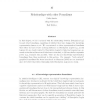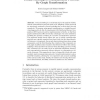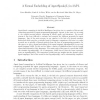268 search results - page 15 / 54 » Expressive Power of Grammatical Formalisms |
APIN
2002
13 years 8 months ago
2002
We develop the scheme of indefinite constraint databases using first-order logic as our representation language. When this scheme is instantiated with temporal constraints, the res...
DLOG
2003
13 years 10 months ago
2003
In this chapter, we are concerned with the relationship between Description Logics and other formalisms, regardless of whether they were designed for knowledge representation issu...
FM
2006
Springer
14 years 5 days ago
2006
Springer
Formal modeling is a crucial first step in the analysis of safety critical communication protocols such as IP Telephony. These protocols are notoriously resistant to formal modelin...
AUSAI
1998
Springer
14 years 22 days ago
1998
Springer
Agent-based computing in Arti cial Intelligence has given rise to a number of diverse and competing proposals for agent programming languages. Agents, in the sense we are using it...
OOPSLA
2007
Springer
14 years 2 months ago
2007
Springer
In runtime monitoring, a programmer specifies a piece of code to execute when a trace of events occurs during program execution. Previous and related work has shown that runtime m...



